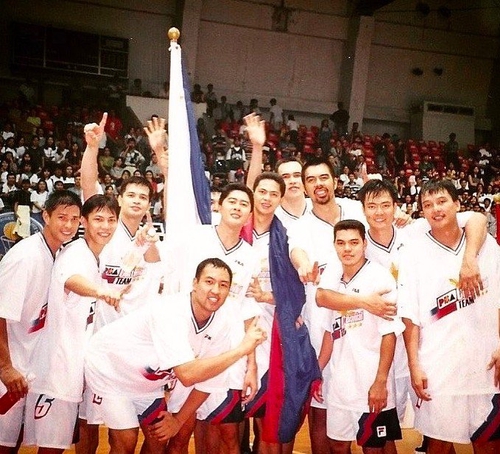It’s quite unfortunate that the Philippines would not field a basketball delegation to the upcoming Jakarta Palembang Asian Games.
The quadrennial meet has long been a showcase of the country’s basketball wizardry, from the time the Philippines won the very first Asian Games basketball gold medal in New Delhi in 1951 and in three-straight subsequent stagings of the Games to those memorable campaigns in Beijing in 1990 and in Bangkok in 1998.

Philippine Dream Team
We notched the silver in that memorable 1990 run, which was the first time professional players represented the country with the legendary Robert Jaworski as coach, and such stalwarts as Mon Fernandez, Hector Calma, Samboy Lim, Allan Caidic, Alvin Patrimonio, Ronnie Magsanoc and Benjie Paras forming the nucleus.
Formed to wrest back Asian supremacy in basketball, this “Philippine Dream Team” almost fulfilled it even winning over North Korea and Japan in the eliminations and semifinals, but lost twice to titan China, who won the gold medal match, 90-74.
After this respectable silver finish, the Philippine team tried again to bag the gold in the next Asian Games in Hiroshima with PBA players anew in its lineup, such as Johnny Abarrientos, Marlou Aquino, Jerry Codinera, Ato Agustin, Kenneth Duremdes with Beijing Games alumni Patrimonio, Calma, and Caidic. But their efforts went for naught as the Norman Black-coached Philippine team went home empty handed following as loss to host Japan in the third-place game.
With this debacle, national basketball officials and the PBA made it a point to send a team that stands the best chance of realizing that dream of winning once more the Asiad basketball gold the Philippines last bagged in the 1962 Games also in Jakarta.
Centennials
The next opportunity was in 1998 in Bangkok, the year of the Centennial celebration of Philippine independence. As such, the country’s basketball team that will compete in the Bangkok Games was dubbed the Philippine Centennial Team—a selection of Philippine basketball’s best at the time, from the player line-up to the coaching staff.
Comprising the Centennial team were Andy Seigle, Jojo Lastimosa, Dennis Espino, Jun Limpot, Vergel Meneses, EJ Feihl, and Olsen Racela joining the star holdovers from the 1990 and 1994 teams Patrimonio, Caidic, Aquino, Abarrientos, and Duremdes. The now winningest coach in Philippine basketball, Tim Cone mentored the team, with assistants Chot Reyes and Aric del Rosario.
Preparations were aggressive, tactical, and expansive.
The team participated in the 1998 PBA All-Star Games, wherein they swept a PBA All-Star Selection in two games.
The Centennials then went on to compete in the 1998 William Jones Cup and again swept the international tournament, capping their campaign with a stirring win over host Chinese-Taipei, 82-72, in the championship game.
Infamous brawl
After their triumphant feat, they would go on a grueling scrimmage tour against NCAA teams in the Midwestern US. In one of those matches—a losing game against a gritty Division I squad Minnesota Golden Gophers—the Centennials figured in an ugly brawl, wherein Seigle and Gophers senior Miles Tarver were ejected. A blurry video showed most of the players exchanging blows, flying kicks, chair hits, and monster tackles in what was considered one of the most infamous bench clearing melees in history.
After that regrettable incident, the Centennials went back home to compete in the PBA Centennial Cup against PBA ballclubs that had two imports. They finished dead last in the tournament.
They would go on to compete in exhibition games, including one against their upcoming Asian Games opponent China.
Bangkok Games
On December 6, 1998, the Centennials began the mission they were formed to accomplish. In the Bangkok Asian Games, they began their campaign spotless. They won a squeaker over favorite Kazakhstan in a very close 53-52 win in the opener, after which the team prevailed in a blowout win against Kyrgyzstan, 91-50.
Continuing their winning ways, the Centennials crushed the United Arab Emirates, 93-57 before waylaying southeast Asian rivals and host country Thailand, 86-60.
After a four-win romp, the Philippine team would face their first acid test, perennial Gold Medal favorites South Korea. While the Filipinos held the South Koreans to slim margins in the first half, they couldn’t stop a fiery offensive bombardment, consisting mostly of the Koreans’ trademark marksmanship from beyond the arc. The Centennials lost by 20 points, 83-103.
Spirited fight
Having lost to South Korea, the Centennial team had the misfortune of having to face defending Gold medalists China in the semifinals. But in a spirited and moving fight, with millions of Filipinos watching through satellite broadcast, they held the mighty Chinese very close in the match—with Patrimonio, Caidic, Seigle, and Duremdes leading the charge.
But despite their heroic efforts, the Centennials could not stop the Chinese from pulling away in the end with a 73-82 loss, dropping to the Bronze Medal face-off against Kazakhstan.
And even though they were frustrated with that near win that could have sent them to a Gold Medal match against South Korea, the Centennials still showed that same spirit and brilliance in its third place showdown against the Kazakhs.
Respectable bronze finish
Again fighting a tight match, the Centennials did not lose their composure and held off their determined opponents to bag the bronze, the last time the country won an Asian Games medal.
Their bronze medal finish was definitely a high point in Philippine basketball, given that the accomplishment was also the last time a national team brought home a major prize in international cage wars.
Definitely, through their ups and downs, the Philippine Centennial team brought the immense honor and pride to a basketball-crazy nation seeking to earn back its once lofty place in Asian and even world competitions.
Comments